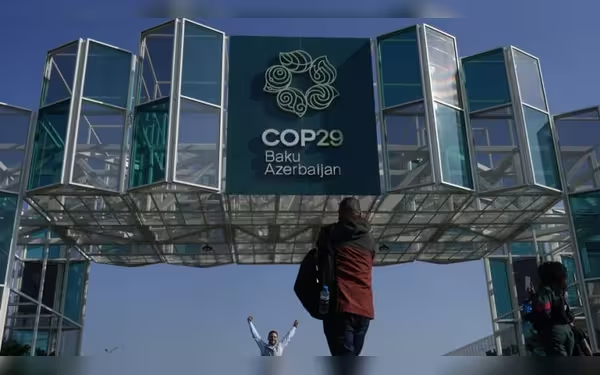Saturday, November 16, 2024 07:29 PM
UAE's Controversial Role as COP28 Host Sparks Global Debate
- UAE's COP28 presidency raises conflict of interest concerns.
- Critics argue hosting in oil-rich nations undermines climate goals.
- Global emissions hit record high, intensifying climate urgency.
 Image Credits: channelnewsasia
Image Credits: channelnewsasiaThe UAE's hosting of COP28 raises concerns over fossil fuel interests and climate action effectiveness.
The ongoing debate surrounding climate change has reached a critical juncture, particularly with the upcoming COP climate conference. The question at hand is whether a petrostate, such as the United Arab Emirates (UAE), should be allowed to host such a significant event. This issue has gained traction following the UAE's successful bid to host the 2023 COP in Dubai, a decision that has sparked controversy and concern among climate advocates.
Historically, the COP conferences have been platforms for nations to come together and discuss strategies to combat climate change. However, the appointment of Sultan al-Jaber, the head of the UAE's national oil company, as COP president has raised eyebrows. More than 100 lawmakers from Europe and the United States have called for his removal, highlighting the perceived conflict of interest in allowing a country that heavily relies on fossil fuels to lead discussions on reducing global emissions.
The situation became even more contentious when it was announced that this year's conference would take place in Baku, the capital of Azerbaijan, another nation rich in oil and gas. Critics argue that hosting the COP in such locations undermines the very goals of the conference. Al Gore, the former Vice President of the United States, expressed his dismay, stating that it is time for the UN Secretary-General to take a more active role in selecting host countries and COP presidents.
Traditionally, the selection process involves five regional groups taking turns to choose a host nation. This year, it was Eastern Europe's turn, and Baku's bid was accepted unexpectedly after a deal was struck between Azerbaijan and Armenia, two countries with a long history of conflict. This decision has further fueled the anger of climate campaigners who believe that allowing a fossil fuel-dependent country to host the COP is a blatant conflict of interest.
Moreover, the implications of this decision extend beyond mere optics. COP conferences provide authoritarian regimes with an opportunity for what some call “greenwashing,” where they can improve their international image while continuing to rely on fossil fuels. This is particularly frustrating given that global greenhouse gas emissions reached a record high last year, contrary to the urgent need for reductions to keep global temperatures in check.
As we approach the COP conference, it is essential to reflect on the broader implications of allowing petrostates to host such pivotal discussions. The world is witnessing increasingly severe weather events, and the urgency to address climate change has never been more pressing. The question remains: can we trust nations that are heavily invested in fossil fuels to lead the charge against climate change? The answer may shape the future of global climate policy and the health of our planet.













